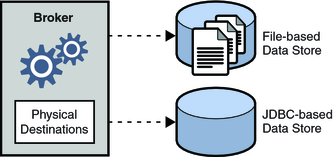| Skip Navigation Links | |
| Exit Print View | |

|
Oracle GlassFish Server Message Queue 4.5 Administration Guide |
| Skip Navigation Links | |
| Exit Print View | |

|
Oracle GlassFish Server Message Queue 4.5 Administration Guide |
Part I Introduction to Message Queue Administration
1. Administrative Tasks and Tools
3. Starting Brokers and Clients
6. Configuring and Managing Connection Services
8. Configuring Persistence Services
File-Based Persistence Properties
Configuring a File-Based Data Store
Securing a File-Based Data Store
Optimizing File-Based Transaction Persistence
JDBC-Based Persistence Properties
Configuring a JDBC-Based Data Store
To Set Up a JDBC-Based Data Store
To Display Information About a JDBC-Based Data Store
Securing a JDBC-Based Data Store
9. Configuring and Managing Security Services
10. Configuring and Managing Broker Clusters
11. Managing Administered Objects
12. Configuring and Managing Bridge Services
13. Monitoring Broker Operations
14. Analyzing and Tuning a Message Service
17. Broker Properties Reference
18. Physical Destination Property Reference
19. Administered Object Attribute Reference
20. JMS Resource Adapter Property Reference
21. Metrics Information Reference
22. JES Monitoring Framework Reference
A. Distribution-Specific Locations of Message Queue Data
B. Stability of Message Queue Interfaces
A broker’s persistent data store holds information about physical destinations, durable subscriptions, messages, transactions, and acknowledgments.
Message Queue supports both file-based and JDBC-based persistence modules, as shown in the following figure. File-based persistence uses individual files to store persistent data; JDBC-based persistence uses the Java Database Connectivity (JDBC) interface to connect the broker to a JDBC-based data store. While file-based persistence is generally faster than JDBC-based persistence, some users prefer the redundancy and administrative control provided by a JDBC database. The broker configuration property imq.persist.store (see Table 17-5) specifies which of the two persistence modules (file or jdbc) to use.
Figure 8-1 Persistent Data Stores

Message Queue brokers are configured by default to use a file-based persistent store, but you can reconfigure them to plug in any data store accessible through a JDBC-compliant driver. The broker configuration property imq.persist.store (see Table 17-5) specifies which of the two forms of persistence to use.